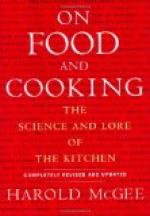EMULSIFIED BUTTER.—Boil the butter with water for half an hour to destroy any germs it may contain; use plenty of water and add the butter to it while cold. When boiled, remove from the fire and allow it to become nearly cold, when the butter will have risen to the top and may be removed with a skimmer, or it may be separated from the water by turning the whole after cooling into a clean strainer cloth placed inside a colander. The butter may be pressed in the cloth if any water still remains. If hardened, reheat just sufficient to soften, and add to it, while still liquid, but cooled to about blood heat, the yolk of one egg for each tablespoonful of butter, and stir until very thoroughly mingled.
Or, add to each tablespoonful of the liquid butter two level tablespoonfuls of flour, rub together thoroughly, and cook until thickened in a half cupful of boiling water. If cream is not obtainable and butter must be used for seasoning, it is preferable to prepare it in one of the above ways for the purpose, using the quantity given as an equivalent of one cupful of thin cream. It will be evident, however, that these preparations will not only season but thicken whatever they are used in, and that additional liquid should be used on that account.
TABLE TOPICS.
A little six-year-old boy went into the country visiting. About the first thing he got was a bowl of bread and milk. He tasted it, and then hesitated a moment, when his mother asked if he didn’t like it; to which he replied, smacking his lips, “Yes, ma’am. I was only wishing that our milkman in town would keep a cow!”
When Horace Greeley was candidate for the presidency, he at one time visited New Orleans, whose old creole residents gave him a dinner; and to make it as fine an affair as possible, each of the many guests was laid under contribution for some of the rarest wines in his cellar. When dinner was announced, and the first course was completed, the waiter appeared at Mr. Greeley’s seat with a plate of shrimp. “You can take them away,” he said to the waiter, and then added to the horrified French creole gentleman who presided, “I never eat insects of any kind.” Later on, soup was served, and at the same time a glass of white wine was placed at Mr. Greeley’s right hand. He pushed it quietly away, but not unobserved by the chief host. “Do you not drink wine?” he asked.
“No,” answered Mr. Greeley; “I never drink any liquors.”
“Is there anything you
would like to drink with your soup?” the host
then asked, a little disappointed.
“If you’ve got
it,” answered Mr. Greeley, “and it isn’t
any trouble,
I’d like a glass of
fresh buttermilk.”
Said the host afterward in
his broken English, “Ze idea of electing
to ze presidency a man vot
drink buttermilk vis his soup!”
Old friendships are often
destroyed by toasted cheese, and hard
salted meat has often led
to suicide.—Sydney Smith.




